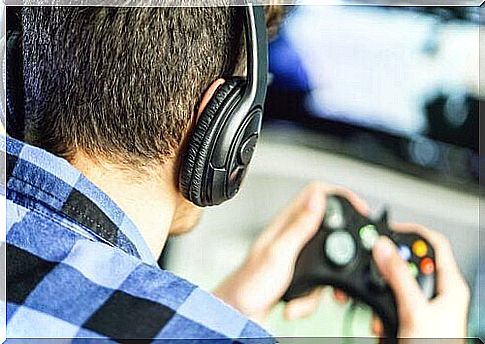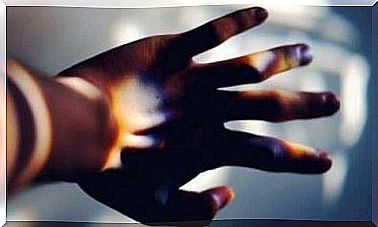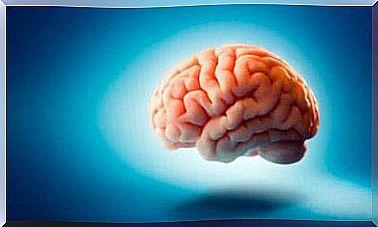Computer Game Addiction: What Is It About?

In recent years, many have sought treatment for teens with problems that have arisen as a result of their internet consumption. This is because it is not uncommon to see young people suffering from diseases such as computer game addiction.
Young people use the Internet to access a wide range of content through several different devices. Their main goal when surfing the web is to make new friends, have fun or learn new things.
However, in recent years, various researches have shown that inappropriate or excessive internet use can have negative consequences. These consequences affect the person’s or their family’s daily life, other interpersonal relationships or their emotional stability.
Computer Gambling Addiction: Is It Real?
The Diagnostic and Statistical Manual of Mental Disorders (DSM-5) states that Internet addiction alone cannot be classified as a mental illness. However, it suggests that there may be the existence of computer game addiction (American Psychiatric Association, 2013).
This has given way to various studies. Thanks to them, there is enough evidence to confirm that excessive use of computer games can get worse with just as negative consequences as those associated with any other known addiction.

Diagnostic criteria
Here are the diagnostic criteria required to diagnose people with computer game addiction according to the DSM-5 .
Repeated use of Internet-based computer games, often with other players, leading to clinically significant functional problems. Five (or more) of the following criteria must be met within 12 months:
- Dealing with Internet-based computer games. (The individual thinks about previous gaming activity or expects to play the next game; computer games become the dominant activity in daily life). Note: This addiction is different from internet gambling, which is included under gambling addiction.
- Withdrawal symptoms after the computer game has been removed. (These symptoms are typically described as irritation, anxiety, or sadness, but there are no physical signs of pharmacological withdrawal).
- Tolerance: The need to spend increasing amounts of time involved in computer games on the Internet.
- Failed attempts to control online computer game participation.
- Loss of interest in past hobbies and entertainment as a result of, and with the exception of, online computer games.
- Continued excessive use of computer games online, despite knowledge of psychosocial problems.
- Having deceived family members, therapists or others regarding the amount of time spent on computer games.
- Using computer games to escape or relieve bad moods (eg feelings of helplessness, guilt or anxiety).
- Having threatened or lost a significant relationship, job, education or career opportunities due to participating in computer games online.
This disorder only affects computer games that are not related to gambling addiction. It does not include the use of the Internet to perform activities required in a business or profession. Furthermore, it is not appropriate to include other recreational or social uses of the Internet in this diagnosis.
Computer game addiction is similar to addiction
Computer game addiction is characterized by excessive and prolonged use of Internet-based games. It results in a range of cognitive and behavioral symptoms, such as a progressive loss of control over the time spent on gambling, tolerance, and withdrawal symptoms. These are similar to the symptoms of drug addiction.
As in drug-related addiction, people with computer game addiction continue to sit in front of a computer and play online games even though they are aware that they are neglecting other important activities.
They usually spend about 8 to 10 hours a day and at least 30 hours a week performing this activity. If they are prevented from using a computer or playing computer games, they become agitated and angry. The severity of their addiction can lead them to spend long periods of time playing, without eating or sleeping.

Social games that disrupt daily life
Another symptom of those who suffer from computer game addiction is that they ignore normal obligations, such as schoolwork or family obligations. The main characteristic of this disorder is a persistent and recurrent participation in internet games, typically in multi-player games, for many hours at a time.
These games involve competition between groups or different players (most often located in different parts of the world) who participate in complex and structured activities involving social interaction.
Team spirit seems to be an important motivator in this disorder. People with this disorder automatically resist other people’s attempts to redirect their attention to their school assignments or personal activities. In this way, the individual rejects personal, family, or professional obligations.
On the other hand, people with computer game addiction often say that they use the computer to “avoid boredom”, rather than to communicate or search for information.
In some of the people studied, researchers found evidence that it is an activation of certain regions of the brain that are not limited to the reward system, which is triggered by exposure to computer games.
A study conducted in China has described the criteria in relation to this condition. The optimal criteria and basis for diagnosis should still be determined empirically. Therefore, we recommend taking the information in this article with a pinch of salt.
If you think you have a computer game addiction, the best thing you can do is seek professional help. Do not hesitate to go to a psychologist. They will be able to help you overcome this addiction, and reduce its impact on your life.








